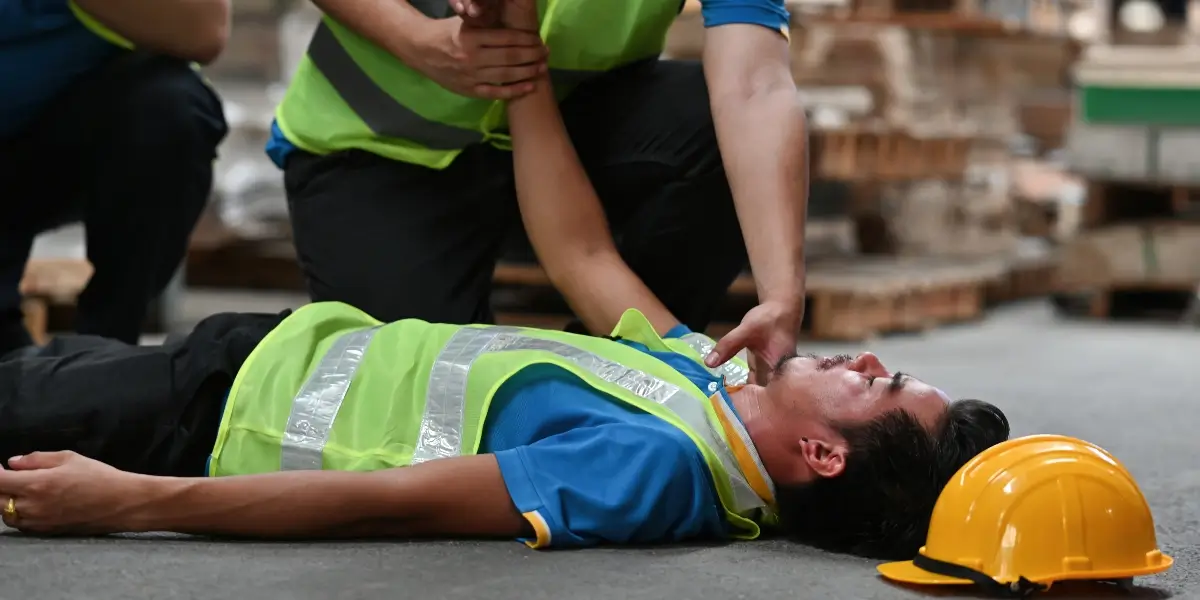A Californian working full-time will spend roughly 40 hours each week at their workplace. For many, their job is the only thing keeping them in their homes and allowing them to care for their family. Experiencing a workplace injury can be terrifying from several aspects, even outside of the injury itself. This California workplace injury guide is meant to help our community know how to proceed if they experience an injury in their workplace.

What to Do Following a Workplace Injury
In 2023, a total of 363,900 nonfatal workplace injuries were reported by private industry employers. Though many employees believe they will never experience a workplace injury, it is crucial to understand what to do if the event does occur. The time to explore what you should do is not following an injury, but before one happens.
The first step following an injury depends on the severity of the injury. If the injury is not severe and time permits before seeking medical treatment, inform your supervisor or manager of the injury. They can then offer guidance specific to their workers’ compensation processes. If your injury or illness developed gradually, then you should still report it as soon as you become aware of it.
Alternatively, if you experience an injury that requires urgent medical treatment, 911 should be contacted. It is crucial that medical care is not delayed in order to report the injury to your employer. Once you are able, let the medical facility know the injury is job-related and report the injury to your employer. It is crucial that you report your injury within 30 days of the incident to ensure you maintain your right to collect workers’ compensation benefits.
Requirements for Workers’ Compensation Benefits
The requirements that must be met for an employee to collect workers’ compensation benefits following a workplace injury are specified in California Labor Code 3600. Each of the following conditions must be met for workers’ compensation laws to apply:
- Subject to workers’ compensation laws. Both the employer and employee must be subject to workers’ compensation laws when the injury occurred.
- Injured during the course of employment. The employee must have been engaged in a task that was directly related to their position and within their scope of responsibilities. Safety requirements, rules, and typical expectations of the position must also have been followed.
- The injury was caused by the employment. There must be a direct link, or proximate cause, between the employee’s duties and the injury they sustained. In employment law, the proximate causation requirement is met if the employment was a contributing factor to the injury.
- Intoxication must not have played a role. To qualify for workers’ compensation, the employee must not have been under the influence of alcohol or drugs at the time of the injury.
- The injury cannot be self-inflicted. If the injury was caused intentionally by the employee, it may not be covered under workers’ compensation benefits.
- A death cannot be willfully or deliberately caused by the employee. Workers’ compensation laws do not apply if the employee intentionally or deliberately caused their own death.
- The employee cannot have been the aggressor. If the injury resulted from a fight in the workplace, the injured employee could not have been the one to start the altercation to collect benefits.
- The injury cannot stem from a crime. If an employee is convicted of a crime and the injury occurred during the commission of that crime, they are ineligible to collect workers’ compensation.
- The injury cannot have occurred during an off-duty activity. Workers’ compensation benefits do not apply when the employee is engaging in off-duty social, recreational, or athletic activities. There is, however, an exception if the employee believed their employer required or expected them to participate.
- Must be filed while an employee. A claim cannot typically be filed following a termination or layoff if the injury occurred while employed.
If you have been denied workers’ compensation but believe you meet the necessary requirements, speaking with an experienced workers’ compensation attorney can help you understand if you have been wrongfully denied. They can also help you determine the next steps forward to ensure you receive the benefits you are owed.
FAQs:
What to Do When You Get Injured at Work in California?
If you are injured at work in California, you should first inform your supervisor of the injury as soon as possible. This report can help prevent any delay or issue with collecting benefits. If the injury is severe and requires emergency medical attention, inform your employer of the injury when you are able. Do not delay emergency treatment to inform your supervisor.
What Is Considered a Work-Related Injury in California?
In California, an injury or illness sustained at your workplace is considered a work-related injury. California Labor Code Section 3600 lays out requirements that must be met and disqualifying conditions for workers’ compensation claims. For example, the employee must have been present at their workplace and performing their position’s duties to qualify as a work-related injury.
How Common Are Workplace Injury Claims in California?
Workplace injury claims are more common in California than in the U.S. as a whole. The rate for occupational injuries and illnesses in California is 3.0, while the U.S. rate is 2.4. Workplace injury claims may be higher in California when compared to the national average because California allows for the collection of benefits, regardless of who was at fault for the injury.
What Should I Do if My Workers’ Compensation Claim Is Denied?
If you believe your workers’ compensation claim was incorrectly denied, there may still be a chance for you to receive benefits. First, you should speak with an experienced workers compensation attorney about your case. They can examine the letter to determine the reason for the denial and then help you file an appeal. They can assist you with gathering evidence and presenting your case to the board.
Fighting for Your Benefits
Receiving workers’ compensation benefits is often crucial for maintaining financial stability following a workplace accident. Kampf, Schiavone & Associates can help you obtain the compensation you are owed. Reach out to our team today for a consultation on your potential workers’ compensation claim.


